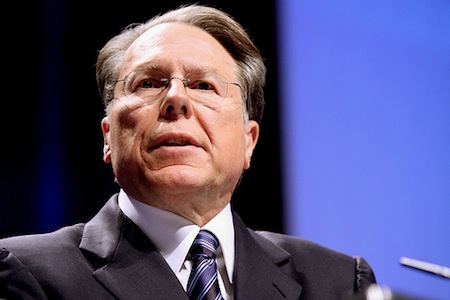Has a Tipping Point Finally Been Reached for Gun Control?

NRA spokesman Wayne LaPierre in 2011. Credit: Flickr/Gage Skidmore.
The December 14 massacre of the innocents in Newtown, Connecticut, predictably, set off a new round of national soul-searching about guns and gun culture in the United States. This latest outrage, some speculated, might be the “tipping point” in persuading Congress to act -- at the very least reinstating the expired assault weapons ban. The National Rifle Association remained silent for about a week, fueling anticipation that the nation’s most powerful lobby might be reassessing its stance against any form of gun legislation. Instead, the NRA doubled down on its hardline position, warning against all efforts to limit gun violence and offering instead to train armed volunteers to guard the nation’s schools -- virtually creating a private NRA militia. The NRA also announced that it would not participate in the discussions of the national commission created by the president (chaired by the vice-president) in the aftermath of the Newtown carnage.
This time, however, there were some genuine signs of movement in the gun control deadlock. In addition to the presidential commission, key conservatives (Texas Senator Kay Hutchinson, former Republican National Committee chair Michael Steele and pundits David Gergen and David Frum, among many others) expressed dismay over the NRA’s position. Even the ultra-right New York Post described the NRA stance with a stunning headline: “Gun Nut! NRA loon in bizarre rant over Newtown.”
It is simply too early to say whether the slaughter in Connecticut will actually turn out to be a historical tipping point. However, it is possible that the NRA has made a crucial tactical error -- much like that made by the American Medical Association in its fight to prevent the enactment of Medicare in 1965. Four decades earlier, when eight leading foundations recommended voluntary public health insurance, the AMA responded: “The alignment is clear -- on one side the forces representing socialism and communism -- inciting to revolution; on the other side, the organized medical profession of this country.” The AMA raised an enormous amount of money, worked against any politician challenging its views and disciplined any doctor who questioned the official line. During the negotiations over the creation of Social Security in 1935, efforts to include national health insurance led to a deluge of AMA literature, telegrams, and phone calls that almost derailed the entire legislation. Franklin Roosevelt promptly ordered all references to health insurance struck from the bill.
President Truman, during the 1948 presidential campaign, became the first president to endorse national health insurance, but the AMA made sure that the legislation went nowhere in Congress. In 1960, the Democratic party platform endorsed national health coverage for senior citizens through Social Security. President Kennedy endorsed the plan in a televised 1962 speech. It turned out to be a devastating political embarrassment when several liberal senators, threatened with defeat by the AMA, abandoned the administration and the bill failed by only two votes. JFK was so angry that he plunged a letter opener into the top of his desk.
Kennedy’s successor, Lyndon Johnson, determined to create the greatest domestic legislative record since FDR, threw his support behind a national senior health plan in 1965: Medicare. The AMA organized massive resistance to the bill, including a lobbying campaign in which it spent a million dollars in about a week. This effort included Operation Coffee Cup, in which doctor’s wives were mobilized to work against the bill by funding prominent speakers across the nation. (At the time, only 4 percent of medical school students were women.) One speaker, Ronald Reagan, warned: “One of the traditional methods of imposing socialism on the people has been by way of medicine. If this proposal is not killed now, you and I are going to spend our sunset years telling our children and grandchildren what it was once like in America when men were free.” The AMA even suggested that its members might refuse to treat patients covered by a national senior health plan.
As it turned out, the AMA’s over-the-top strategy backfired. Public opinion turned sharply against what increasingly seemed to be a rigid and extremist position. Indeed, President Johnson told an aide that the AMA had lost all public credibility. He compared the AMA to a bunch of "dumb chickens" who continue to eat despite standing knee-deep in their own shit, and predicted that their self-serving and alarmist propaganda would no longer work. Medicare passed the House 313-115 and the Senate 68-21.
Only time will tell whether the NRA, like the AMA in 1965, has fumbled an historic opportunity to be a part of a renewed discussion of gun policy in America.
